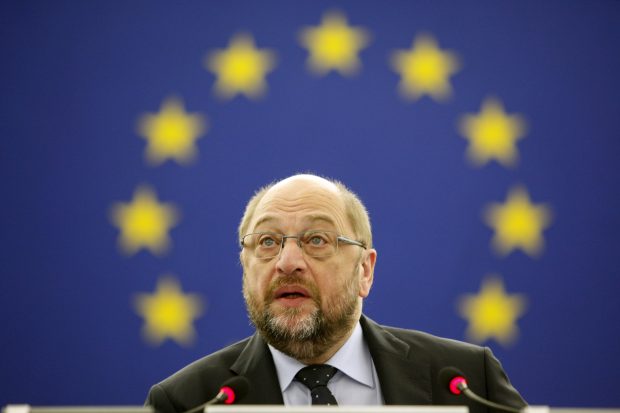Shock news! Hold the (virtual) front page! Martin Schulz, arch bogeyman of every British Brexiteer – and even a few Remainers – is leaving the EU. No, Schulz hasn’t renounced his support for ‘ever closer’ European Union. Rather, he’s stepping down as President of the European Parliament to stand as an MP for the SPD, Germany’s Social Democrats. Why should British voters care? Because Schulz has been widely tipped as a potential leader of the SPD, the only party with a real chance of beating Angela Merkel’s CDU in next year’s Bundestag elections. And the winner of that election will steer EU policy throughout the Brexit process, and beyond.
Second only to Jean-Claude Juncker, Schulz is the Eurocrat Eurosceptics love to loathe. Yet ironically, his robust defence of the EU’s ‘four freedoms’ (goods, services, capital and people) puts him on the same side of the argument as his fiercest British foes. The paradox of Brexit, as far as EU-UK negotiations are concerned, is that the most ardent British Europhobes and the most ardent Continental Europhiles (like Schulz) are actually in broad agreement. They both want a hard Brexit – no single market access without freedom of movement (and vice versa). You may find this hard to stomach, but if you’re a hard Brexiteer, Martin Schulz is your best friend.
So is Schulz’s departure from the European Parliament a sign of his waning influence? Far from it. His return to German politics will give him an even stronger voice in the great Brexit debate. Schulz’s SPD are currently becalmed on 22 per cent, ten per cent behind Merkel’s CDU. Polls suggest Schulz would win more votes than the current SPD leader, Sigmar Gabriel, who is Merkel’s Economics Minister (and vice chancellor) in her ‘grand coalition’ of CDU and SPD. Gabriel is competent, but like a lot of competent politicians nowadays he doesn’t thrill the voters. To stand a chance against a resurgent Merkel in next year’s elections, the SPD need to make a change – and soon.
Like the Tory-Lib Dem coalition in Britain, Germany’s grand coalition has been bad news for the smaller, weaker partner. As with Clegg’s Lib Dems, Gabriel’s Social Democrats have shared the blame for the failures of the Grand Coalition, while Merkel’s Conservatives have taken credit for its successes. Germany’s SPD are far bigger than Britain’s Lib Dems (they’ve governed Germany for 20 years since 1969) and so they’ve got far more to lose. After the last Bundestag elections, in 2013, they had enough MPs to form a left-wing coalition with the Greens and Die Linke (Germany’s far left party) but instead they chose to team up with Merkel’s CDU. This deal gave them six ministries (including finance and defence) but the price at next year’s elections may be steep. Could they face a wipe-out like Labour’s annihilation in Scotland? In today’s febrile atmosphere, who can tell?
Like Labour, the SPD’s support is concentrated in urban areas, and while its support remains strong in larger, more cosmopolitan cities, it is under threat in smaller, post-industrial towns. As with Labour as well, its greatest fear isn’t their conservative rivals, but a new anti-immigration party. Direct comparisons between Ukip and Alternative fur Deutschland are invidious, but their strategic positions are strikingly similar. AfD is particularly appealing to white working-class voters outside the major metropolitan conurbations, the so-called ‘left behind’ in a similar way to Ukip. Since it was founded, less than four years ago, the rise of Frauke Petry’s AfD has been remarkable. Current polls put her on 12 per cent, ten per cent behind the SPD, but as Trump (and Brexit) has taught us, opinion polls aren’t what they used to be.
It’s the threat of Petry’s AfD, not Merkel’s CDU, which makes Schulz’s return so attractive for the SPD. Bald, bearded and bespectacled (and already sixty), he’s hardly a Blairite poster boy, but in Germany he has the common touch. There’s nothing elitist about his background. The son of a policeman, and a decent footballer in his youth (until his nascent career was cut short by injury) in 1987, aged just 31, he became the youngest ever mayor in North Rhine Westphalia – a huge urban sprawl with a population of 18 million, straddling the Ruhr, Germany’s rustbelt, as well as smarter cities like Dusseldorf and Cologne.
North Rhine Westphalia, where Schulz will stand as an MP, is a paradigm of the SPD’s twin challenge. Here, as elsewhere, a successful SPD leader must fight a battle on two fronts. In richer cities like Cologne and Dusseldorf, the SPD need a candidate who can take on Merkel’s CDU. In poorer cities like Essen and Dortmund, they need a candidate who can take on Petry’s AfD. Schulz can play both roles. His job as President of the European Parliament has given him a high profile in Germany, yet his long absence from the national scene (he’s been an MEP since 1994) has protected him from the messy compromises of coalition politics. Uniquely, he can play the insider against the CDU and the outsider against AfD.
Next year, Merkel’s foreign minister, the SPD’s Frank-Walter Steinmeier, will move upstairs to become German President. Could Schulz fill this vacancy? Technically, he wouldn’t need to wait until he became an MP. If he became foreign minister, it’d be the perfect platform for a tilt at the SPD leadership – traditionally, foreign ministers enjoy improved ratings in the polls. And if Schulz does get this post, Britain can expect to face a far more combative politician than the urbane and diplomatic Steinmeier – and Merkel can expect a real battle in 2017. Chancellor Schulz? It sounds unlikely. But we’ve already seen stranger election results this year.






Comments